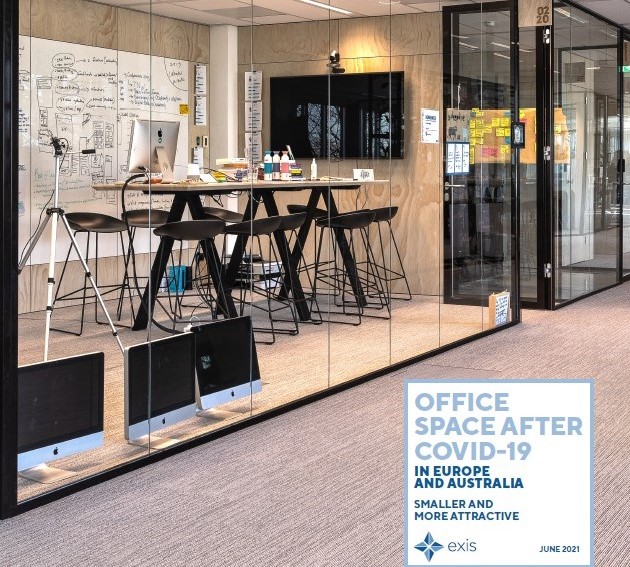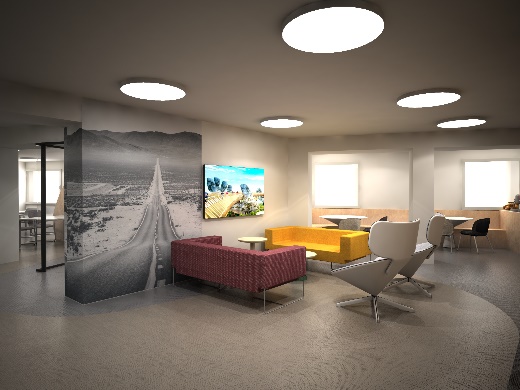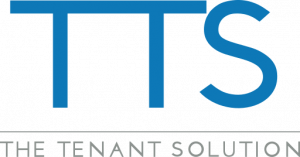COVID-19 has put the global office market on fast forward. Working from home has become a fact of life, and digital communication tools have been embraced en masse. And all this is impacting office design across the world. How? We tell you about it in this report that investigates the experiences of EXIS partners in various European countries (Spain, Portugal, Belgium, France, the Netherlands, Poland, Sweden and the United Kingdom), as well as Australia.
Office workers can carry out 54% of their activities at home, including team projects and meetings. The three most important plus points for working from home are not wasting time commuting, finding it easier to organize your time and being able to concentrate. This was shown in the “Homeoffice Factor” a study made by our partners in the Netherlands, Solved. The research was conducted among 6,000 Dutch employees. No fewer than 80% of those taking part is positive about working from home. You could conclude from this that organizations need fewer square meters in office space and could achieve structural savings on rent and facility costs.
Scale down or wait-and-see?
The question now is, to what extent these office modifications and savings will really take place? Once the pandemic is somewhat under control, will employees want to return to the office en masse? Or will working from home be the new normal for large groups of employees? How will work change because of this? What does this mean for office locations, square meters, and interiors? And how do ideas and developments differ per country? These questions are posed in the EXIS whitepaper to various partners in Belgium, the UK, France, the Netherlands, Poland, Spain, Portugal, Sweden and Australia, as well as to commercial real estate agents. Real estate agents are aware of what is important to their clients and the changes that are taking place in the market. The companies give us an idea of where they are now, in the summer of 2021. In this post we focus on the general conclusions and the situation of Spain and Portugal, but you can consult the information of other countries in the PDF that accompanies this Article.
Uncertainties are considerable but working from home is here to stay
A world ravaged by a pandemic changes continuously. The uncertainties are and remain considerable. All those interviewed agree on that. Nobody knows exactly what will happen. In the meantime, decisions need to be made about rental prices and contracts and about office sizes. It’s a dilemma recognized by all parties in all countries. Many companies have decided not to wait-and-see but are taking action now. That much is clear. Because they’re almost all in agreement on various issues. Working from home is here to stay. And offices need to adapt to that.
Offices move to urban areas
With working-from-home employee numbers being many times greater than ever, offices can also become smaller: by around 30 per cent according to those interviewed. Many permanent workspaces will become obsolete, and the office will become much more of a meeting space. Hybrid working is finally being embraced on a large scale. Most interviewees were also in agreement about something else: Offices must become more attractive. Only then will we succeed in getting employees back to the office and keep them committed to the organization. Companies aim to make more square meters available per employee.
Growing percentage of people working from home
“Working from home has now become the constant factor. That’s not going to go away,” says Daaf Serné, Director, Global Real Estate, Workplace & Sustainability at ServiceNow, a SaaS company with thirteen thousand employees in 79 locations across 29 countries. “This now really is becoming an official part of our global policy. This was the case in the US, where 15% officially worked remotely, but this wasn’t yet formalized in most other countries. The last couple of months we have been very busy looking into the Future of Work (FoW). We’re expecting that our employees want to work at home, as much a 20% to 30% of their time, and that percentage can only increase if we implement our FoW strategy successfully.”
No downturn in office markets
“Working from home seemed to work out really well. Productivity even increased,” explained Kamil Stanuch, former Director of Grand Parade in Krakow in Poland, an online gambling company that employs 450 people which forms part of the larger William Hill. Stanuch continues: “And yet I don’t believe that working from home will become the norm for everyone. People also like coming to the office. We checked with our employees and we’re expecting them to want to work two to three days at home and spend the other days at the office. That’s partly because some people don’t have a quiet and pleasant workplace at home. So I don’t believe that the office market will collapse. What I am seeing is companies scaling down their office space and changing how they use their offices. There will be more spaces for team projects.
Our office work has changed substantially
“Prior to COVID-19, almost all employee staff worked full-time at a dedicated desk in the office. We had a rather traditional culture. But that’s now changed substantially,” says Michael Baker, European Real Estate Director at LKQ, an American supplier of car parts with some twenty-six thousand employees at 1,200 locations in twenty countries in Europe alone. Baker continued: “Despite the many challenges we have experienced during the pandemic, our employees have shown amazing resilience and we have seen an increase in productivity. The use of Teams and Zoom replaced travel and accommodation costs which had a direct benefit to our bottom line. We have discovered homeworking and now encourage our office based employees to do this, where possible. To enable that we have introduced a booking system for desks at our newly refurbished locations and are looking to roll this out over time at our larger office campuses.”
The structural effects of working from home are still unknown
“We still don’t exactly know what will happen,” stated Esther de Koning, Global Head of Real Estate at Signify, formerly Philips Lighting. The company, a world leader in lighting, has 37 thousand employees and is active in over seventy countries.
De Koning states: “Although it looks as though working from home hasn’t really impacted productivity so far, we don’t know whether that will still be the case in the long term. And how do you measure that exactly? And you also need to take into account the fact that when people get together in offices they come up with valuable ideas. And many people work too hard and for too many hours if they’re working from home, which does impact their welfare. It’s important to consider that too. The structural effects of working from home are still difficult to chart. That’s why we’re not making any drastic changes to our real estate strategy because of COVID-19. Working from home has many advantages but there are disadvantages too. For instance, not everyone has a pleasant workspace at home, internet connections vary around the world, and some types of work are difficult to implement remotely.”
No radical choices
And yet, according to De Koning, Signify is scaling down its offices: “But we were already taking that step. Many of our offices were underused. The environment is changing, and we’re changing with it. In the future and more than ever, employees will need a reason to come to the office. Offices can become smaller, but they need to be more attractive and offer a wider variety of workspaces.” The company isn’t making any radical choices here either. De Koning continues: “We’re doing this gradually and starting with offices where the contracts are already expiring. There will be more areas for team projects, space for employees to meet informally, and spaces where people can concentrate. We’re also investing in facilities to improve employee health and welfare, including a good mix of workspaces. But not all offices will be the same. We’ll decide what we need per location.” De Koning also thinks the open plan office is the future. “That’s for sure. It stimulates that vital communication between employees, although I do think that spaces for team projects shouldn’t be mixed too much with spaces for concentration. These need to be separate zones to limit the negative consequences of noise nuisance.”
Southern countries prefer employees to work at the office
Baker expects the pre-Covid office-based employees to work one or two days a week from home from now on, with just three or four days at the office. Baker continued: “The surface area of our offices won’t change because our office spaces are often part of warehouses. After all, we are a logistics company. But we can use the extra office space that is released to create more collaboration spaces, meeting rooms, and possibly create more space to hold stock in our warehouses.” A metamorphosis will take place, however, when it comes to workspaces. Baker added: “There will be more collaboration space, insulated spaces where people can concentrate, but importantly we’ll also be working smarter with new digital tools.” There are differences between countries too. Baker continued: “The southern countries are used to a more cellular environment with private offices. We are trying to change this culture and promote open plan collaborative areas and the use of home working. Improving our IT infrastructure is critical to make this seamless transition and embrace remote and flexible
working.”
“ Future back offices are being established in the South Iberian Peninsula to tempt new talent and retain employees.”
Gonzalo Checa Astier (Founding Partner TTS The Tenant Solution)
Comfort at the office
“For us, offices have started to look more like hotels,” explains Serné. “We want to offer amazing employee experiences to employees. Enjoying a good cup of coffee and breakfast on arrival, for instance. The office needs to be a welcoming and attractive place, an actual ‘destination’ that you’d like to visit in your spare time.” Offices will preferably be in central locations and close to public transport. Serné continues: “Offices are moving from the outskirts to urban areas. Most employees want good public transport and access to restaurants, shops, and culture.”
The office must be a minimum amazing product
Stanuch predicts that companies might aim to open more smaller hubs in Poland, where employees can come to collaborate. “Companies might prefer ten offices of 500 square meters than one of 5,000 square meters. For us it’s easier to get an employee from India or Brazil to come to our office in Krakow than a Polish employee who lives a hundred kilometers away. That’s why some companies want to spread their offices. They’ll be smaller, nicer, and more flexible. The office must become a ‘minimum amazing product’.”
Northern countries are more open to change
“As more people are working at home, offices are gaining another function,” says Serné. “It’s no longer about the place but the experience. We’re now designing our offices so that people can meet each other and connect with each other. Perhaps we need to reformulate ‘getting back to the office’ as ‘getting back together’.” Serné is expecting that open plan offices will take on a new form: “There’ll be many open spaces that are smaller and cozier with flexible furniture and a few separate rooms where people can concentrate or make a call. What’s important is that the workspaces are varied and different. There are also significant differences between countries. Generally, we’re seeing that the northern European countries are somewhat more open for change and for making offices more flexible, whereas the southern countries prefer to stick to their traditions.”
Fewer bricks in the future – office gardens new style
Serné is expecting fewer bricks to be needed in the future. “We’re making our portfolio much more flexible. We’re switching to parties that can offer us the opportunity to scale up and down flexibly.” Stanuch does, however, see a future for physical offices. “As soon as a crisis happens, companies automatically start optimizing and making cutbacks. And that’s the case now, too. Once business is booming again, offices will continue to be an important statement. As company you want to show that you exist and that you have a ‘cool’ office – a flagship with your name on it. Moreover, you need an office that accommodates not only employees but particularly teams. Communal areas really help with this.”
Sustainability
In conclusion, Baker emphasized the importance of sustainability. “If companies want to attract talented people, they’ll need to have a clearly defined environmental strategy. In our business this covers our buildings, transport, suppliers and our people. Continuous improvement to reduce our carbon emissions
is essential. We are currently installing a 4MW photovoltaic at our Central Distribution Centre in The Netherlands and are upgrading to LED lighting across multiple locations across Europe. This is illustrative of only a sample of the projects relating to our buildings that we have on the go at the moment.” Sustainability is also a high priority for ServiceNow. Serné continues: “As a tenant, we’ll be setting more and more demands as far as sustainability is concerned. The office of the future must be sustainable. That’s important to us as a company. With all the changes that are currently taking place, we’re also including these developments in our plans.” Sustainability is also an important part of the Signify business strategy. De Koning explains: “We are certainly looking at how ‘green’ a building is, but affordable choices aren’t always available for every location. I think that’s going to change. Tenants are making their sustainability demands known. And with good reason, as that’s the key to the future.”
What is the situation in Spain and Portugal?
Gonzalo Checa Astier, EXIS member and founding partner of TTS The Tenant Solution, gives us the main guidelines.
“Once the crisis is over, we’re expecting employees in Spain and Portugal to be working from home for around 1.5 days and working the remaining days at the office. People prefer working at the office from Tuesdays through Thursdays. So, the challenge will soon not only be to get employees back to the office but to stagger their days at the office. We’re also seeing many people relocating from the city to larger homes in the country. This raises the barrier of commuting to the office, which is why offices really need to offer something extra and is why organizations are establishing their back offices in attractive locations, preferably by the coast. That’s where people do want to work either side of the weekend. Companies are also seeking offices with attractive private terraces in an attempt to attract employees.”
Increase in vacant properties while rents are falling
“The consequences for the commercial real estate market inSpain and Portugal are considerable. There’s an increase in vacant properties, and rents are falling. It’s clearly become a tenant’s market since COVID-19 and will remain that way for around five years. Our big clients are asking us to re-evaluate their portfolios and consolidate these where possible. They also want to renegotiate both the contracts and the rental. And the bigger companies now want to relocate to the south of Spain and Portugal, where offices are cheaper and the locations are more attractive for employees.”
Permanent workspaces are here to stay
“In our culture, permanent workspaces are probably here to stay. Many Spanish and Portuguese companies value traditions and that also translates to the working environment. We are expecting that offices in 2022 will still comprise 75% permanent workspaces with 25% being designed as social meeting spaces. Offices will also mainly be designed as office gardens, with many open spaces and just a few separate rooms.”
TIPS
• People will soon be working from home for 1.5 days a week.
• Staggering their days at the office will be a challenge.
• Tendency to look for Southern Europe as a location for “ back office departments “.
• It’s become a tenant’s market.
• 75% of office space is still set up with permanent workspaces.
Time to act now
Times are changing. Thanks to new technology and the fact that people have to work from home as a result of COVID-19, a change in behavior has taken place. Anywhere in the world, employers en employees in the service industry, have experienced the fact that working from home can be pleasant and effective. It works. To prevent employees from falling back into old habits, now is the time for organisations to take actions and cash in on this opportunity by adapting their offices to the new reality. Do you need help with this? Get in touch with us and we will make you a study without obligation.
Or contact with Gonzalo Checa Astier (TTS Founding Partner and Real Estate Director):
- Mail: gonzalo.checa@tts-sl.com
- Phone: +34677937567
10 TAKEAWAYS
- Working from home is ‘here to stay’.
- Offices move to urban areas.
- ‘Hub and spoke’ becomes more popular.
- Offices will be smaller.
- Offices will be more attractive.
- There will be a wide variety of workspaces.
- Norhern Europan countries are open to hybrid working.
- Southern European countries prefer to stick to traditions.
- For some, the dedicated workstation is a thing of the past, for others it is here to stay.
- Technology is key.



